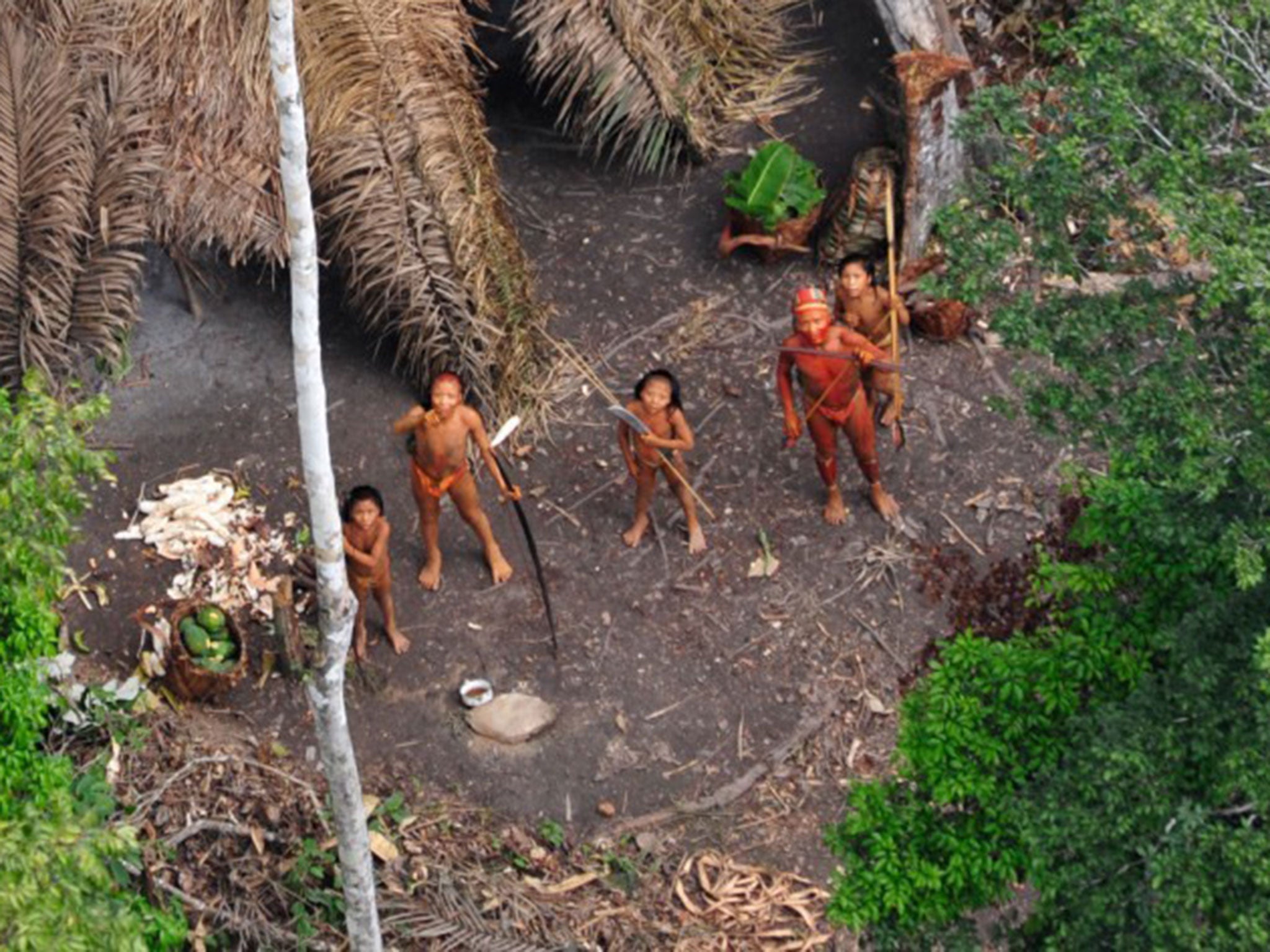'Lost' tribe returns to the rainforest despite the threat of violence and disease
First-world illness and drug traffickers infiltrate an isolated people

When they emerged from the forest on the outskirts of an Ashaninka indigenous community on the upper reaches of Brazil's Envira river, it was the first time in recent history that members of an uncontacted tribe of Amazonian Indians had chosen to leave their home and visit a settled population. But 80 tribe members have now returned to the forest on the Peru-Brazil border, despite the threat of violence and disease.
Before they went back, some who were showing flu-like symptoms were immunised by government doctors. That some of the tribe were already ill could explain why they took the unprecedented step of entering a settled village last month.
It has also emerged, however, that they were fleeing heavily armed drug traffickers who had attacked them upstream in Peru – showing that outside incursions are being made deep into the heart of their traditional protected territories.
Previously, it had been thought that they had been disturbed by the presence of heavily armed loggers, a growing industry in Peru. The mahogany and teak harvested by the gangs is believed to be destined to be made into garden furniture in Europe or the US. Under international law, the Indians have the right to their own traditional territories.
The disclosure by Funai, Brazil's Indian protection agency, that at least seven members of the group were suffering from a virus normally found among outside populations has caused deep alarm among campaigners for the rights of indigenous peoples. It is not known whether other members of the tribe were sick and had refused to receive medication, prompting fears that they could spread disease on their return to their centuries-old way of life.
The spread of minor ailments such as measles or even the common cold has in the past led to deadly epidemics devastating populations of tribes which have built up no immunity.
José Carlos Meirelles, of Funai, said the tribe had gone back to their villages where the infection could spread to other members of their community. He said the Brazilian government now planned to re-establish a permanent base of officials in the highly remote region to offer better protection in the future.
Linguists brought in to help mediate the contact – the first with an unknown tribe for more than 30 years – said the Indians reported "suffering acts of violence" on the Peruvian side of the border. Cocaine smugglers are known to be active in the region as well as loggers, flouting the land rights of the Amazonian communities. It is the first time in recent memory that an uncontacted tribe has voluntarily left isolation.
Contact, in the remote village of Sympatico in the state of Acre more than a week's travel by foot and canoe from the nearest road, came four years after a tribal group was filmed from the air in 2010 very close to Sympatico. It is believed there may be as few as 600 uncontacted Indians remaining in the area. But no one knows exactly how many are now living in the pristine forest of the western Amazon.
Fiona Watson of the human rights organisation Survival International told The Independent on Sunday it was still unclear what had happened to the tribe: "The uncontacted Indians said they were attacked by non-Indians in the headwaters of Peru. It is possible they contracted flu from that or they might have contracted it when they came to the village."
Members of the Ashaninka had laid out clothes as a gesture of friendship after first spotting the tribe on the edges of the forest near their settlement in June, possibly infecting the tribe.
In the 1970s, some 20 per cent of the Yanomami tribe, around 1,500 people, died in an epidemic brought by construction workers sent by the government to build a motorway through their territories.
Ms Watson said it was vital Peru and Brazil honoured their commitment to protect the rights of indigenous peoples: "Policies are worth nothing if they are not being enforced.
"The law might exist on paper, but more people are desperately needed on the ground."
Peru has two reserves where there are uncontacted tribes, including the 481,500-hectare Murunahua Indigenous Reserve. Campaigners say official attitudes towards tribal peoples in Peru have traditionally lagged behind its neighbour.
Ms Watson said: "They returned voluntarily, which indicates they want to go back to their community and carry on living their way of life. From previously uncontacted people I have interviewed over the years, these groups appear much more aware of outside society than we think they are.
"They may have been watching from the forest. They are experts in their environment and they can hide and spot anyone encroaching on to their land – watching and assessing the situation.
"They will undoubtedly have built up a picture of the society around them. But they will have received mixed messages. They will have seen the worst – being shot at, contracting diseases and being pushed out of their land. On the other hand, they will have had medical treatment and want some of the goods they have seen."
She added: "Given the land and the space, they are able to survive, thrive and live well. One day they may choose to make contact, but that must be up to them."
Survival International is urging people to write to the Peruvian and Brazilian governments to urge them to protect uncontacted tribes.
Visit survivalinternational.org for more information
Subscribe to Independent Premium to bookmark this article
Want to bookmark your favourite articles and stories to read or reference later? Start your Independent Premium subscription today.

Join our commenting forum
Join thought-provoking conversations, follow other Independent readers and see their replies